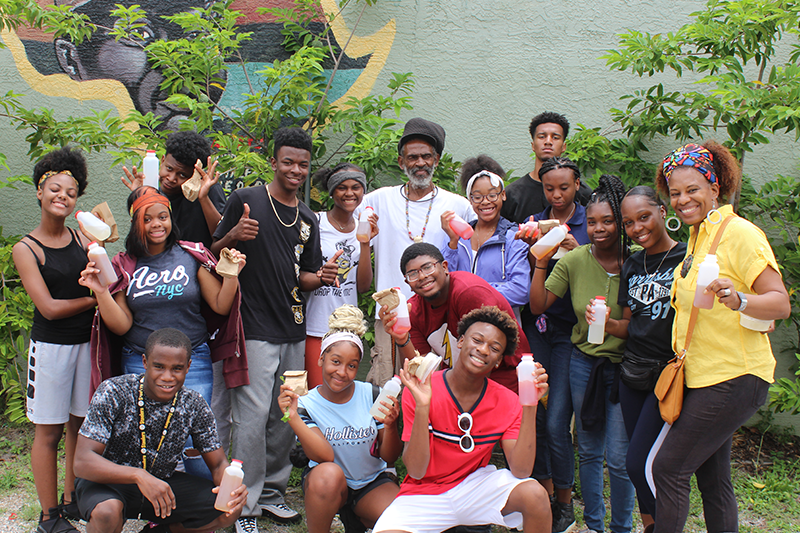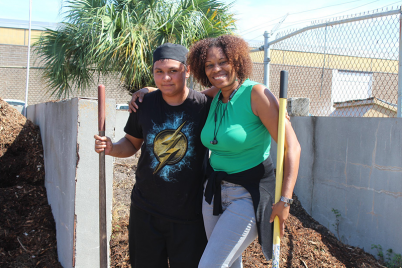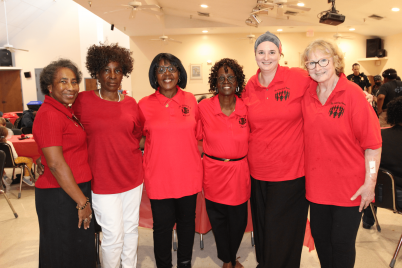Fifteen high-school-aged interns spent the summer gardening, learning how to start a business from the ground up all while earning a salary during the Youth Farm summer pilot program housed at the Enoch Davis Center.
BY JEFFREY ZANKER, Staff Writer
ST. PETERSBURG — The new Youth Farm project at the Enoch Davis Center finished its summer pilot program in July and will start up again Sept. 9. It aims to empower youth to lead urban agriculture projects under community guidance and resources.
From June 10-July 18, 15 high-school-aged interns attended the Youth Farm pilot program with 18 instructors covering a variety of areas such as leadership, entrepreneurship, cooperatives, food prep safety, farm designs, farming and creative writing.
During the six-week pilot, the youth visited nine gardens including Agrihood, Bartlett Park Community Garden and Greens and Things Urban Farm. Activities included clearing areas, planting, learning about composting, harvesting fresh fruits and trying a variety of plants.
The pilot also allowed youth ambassadors to meet prominent community leaders such as Senator Darryl Rouson, Mayor Rick Kriseman, County Commissioner Ken Welch, Deputy Mayor Dr. Kanika Tomalin, local historian Gwendolyn Reese and City Councilwoman Lisa Wheeler-Bowman.
The most distinctive part of the farm project is not just teaching teens about gardening but teaching them how to create and manage a business through the cooperative model.
“It is a very youth-led, youth-driven program,” Carla Bristol, the collaboration manager, said.
Bristol was hired in late May as the collaboration manager for the Youth Farm. She is also responsible for the Food Systems Center at Pinellas Technical College. She wants to impart her knowledge and experience in business, community building and business development with the youth.
As for gardening, she describes herself as “at best an accidental gardener.” Growing up in the Caribbean, she would often pick bushes to make tea.
Although the farming aspect is new for her, working and supporting youth isn’t. She has a long history of mentoring youth going back to her days in corporate America leading back to New York.
The Youth Farm began when the City of St. Petersburg collaborated with University of Florida’s Institute of Food and Agricultural Science Extension Family Nutrition Program and TASCO (Teen Arts, Sports, and Cultural Opportunities) conducted a survey in the summer of 2017.
More than 100 surveys responded in support of the garden project with 82 percent indicating they’d like to volunteer. Stakeholder workshops were then held in 2018 to discuss ideas and strategies to engage partnerships, community participation and other steps.
About 65 stakeholder representatives from 32 different organizations involved in youth and workforce development to education and food systems attended the workshops. Youth farms around the country such as Grow Dat Youth Farm in New Orleans were used as models.
According to Rick Smith, St. Pete’s economic development manager, city council approved the project last year. Their contribution was a total of $305,000 for the interns’ stipends, the site’s preparation and remediation through the Community Redevelopment Area (CRA) tax increment financing (TIF).
The Foundation for a Healthy St. Petersburg also contributed around $200,000 towards the job positions through spring 2020.
The future farm will be located behind the Enoch Davis Center on a 0.83-acre parcel of land where houses once stood. An environmental assessment, funded by an Environmental Protection Agency Brownfields grant, found unwanted chemicals and mold.
Garden remediation funds were approved by city council in July for cleanup starting late this month through September. The cleanup will remove contaminated soil and backfill the area with fresh compost. Another assessment will determine if plants are better grown in the ground or raised beds.
Bristol expects completion of the farm by next summer.
For the pilot, a community outreach team was formed for recruitment. According to Smith, about 80 applications for youth interns and supervisory positions were reviewed. The team selected interviewees based on references and CRA residency, which encompasses Fourth Street to 49th Street and from Second Avenue North to 30th Avenue South.
Each speaker taught one of the farm’s key components: entrepreneurship experience and training, youth leadership development, food systems training and education and culinary training.
Elizabeth Siplin, the founder of Empact Solutions, instructed the leadership portion using games such as Taboo to help identify leaders and steer the shyest interns into leadership roles, which helped bring them out of their shells.
Emmanuel Roux, who works at Agrihood, introduces the group to urban farming.
“Once they get their hands in the dirt, they are going to do very good things… they have energy and interest and want to have an impact in the community,” Roux describing the group’s interest in gardening.
The group partnered with more than 40 organizations including the City of St. Petersburg, Foundation for a Healthy St. Pete, Pinellas Education Foundation, Pinellas County Schools, St. Pete Time Bank, Florida CEED and Sustainable Urban Agriculture Coalition.
Interns receive an hourly stipend of $10 to $12. During the summer, some earned unpaid credit hours while attending meetings and doing extra work. In partnership with St. Pete Time Bank, those hours are now stored and ready to exchange for other goods and services such as tutoring, repairs or babysitting.
“They’re here by choice,” Bristol said. “They loved being able to attend meetings, meet community leaders, engagement with our seniors and have their voices be heard and valued.”
For some of the youth, the program sparked interests not only in gardening but also in business and leadership skills such as Kareem Alexander.
The Gibbs High School student joined the program when recruiting members came to Bartlett Park where he attended camp.
“From there to now, I’ve just been with this whole program,” Kareem, 15, said.
He remembered the first two weeks of just sitting and listening to lectures. Soon the instructors incorporated activities such as putting a marshmallow on top of a noodle tower without it falling before five seconds. He said that the lesson taught him to have a strong structure “to be able to have our business grow.”
“Everything they taught us was very valuable,” said the budding entrepreneur. “Stuff we can take to the real world and help make the youth farm grow.”
Kareem was elected president of the Youth Farm board. He has represented the group in panel discussions and community meetings such as the Citizen Advisory Committee.
Jamar Tarber applied through the Pinellas County Urban League while looking for jobs “to stay out of trouble.” He likes being out in the sun doing gardening work.
“I got to try new things… fruits I thought I’d never eat,” Jamar, 17, said.
Kalia Early, a St. Pete High student, saw the group as an opportunity to seek her interest in “growing things” and starting a garden. From making dishes to making friends, she described the program as a “really fun way to have a job and work.”
Being the group’s secretary, Kalia is learning how business operations work. She wants to own a skincare business in the future.
“I have never done anything like this,” said the 14-year-old. “It’s interesting that I’m a kid and that I can also be a leader.”
For Anaya Graham, who attends The Boca Ciega High School, it was an opportunity to learn how gardening works.
“I thought you just put it in the ground and put water on it,” Anaya, 14, said. “But it’s more than just putting it in the ground and throwing water in it.”
Anaya learned leadership skills such as “taking a stand” and “bring out your own ideas.” She is looking forward to seeing what new concepts will sprout forth from her group in the coming months.
Fifteen-year-old Ashton Williams, who is already sounding like an agriculturist or ecologist, is interested in growing his own food.
“There is less demand to go to the supermarket, so there is less pollution,” said the Gibbs High School student about the importance of gardening.
Ashton feels working with others has made him more sociable, and wants to start a garden at home so he can teach his family.
Lakewood High’s Asianna Mckinnes sees herself as an independent person. She said that talking and sharing ideas was a challenge for her.
“It was amazing to me. It was really new,” said the 15-year-old.
The main goal of the farm, Bristol said, is growing healthy food that can be sold to the community. They currently have a mini-garden with about 300 seeds planted including pumpkin, cucumber and squash.
The program is in the process of forming a food cooperative, which Asianna describes as “every member gets a voice… and it’s not just a one boss thing.”
Meanwhile, the interns have created presentation boards of future garden designs. Their suggestions include tool sheds, book houses, solar panels, a learning center and a gazebo.
The farm has no official title yet, and the group is looking for community input in the naming process. Community discussion and funding will determine the final look.
Bristol describes the pilot program as “a rich summer” with the young people taking opportunities to learn and take charge. Watching teens leading meetings, providing demonstrations, electing their own board and talking with community leaders is “a major development.”
“In a few weeks, they were more open, less closed,” Bristol averred. They enjoyed “being part of the program.”
The alpha class will mentor the fall cohort, which beings Sept. 9 and runs through Jan.18 at the Enoch Davis Center. The 18-week fall sessions are scheduled Monday through Thursday from 3-5 p.m. and every second Saturday from 8 a.m. to noon.
The summer cohort will continue on in the fall and learn more about marketing and forming cooperatives. Kareem and his fellow interns will attend local meetings, participate as workgroups and steering committee. Other responsibilities include creating by-laws, forms and schedules and a community market.
As for the community, monthly meetings entitled “Crockpot and Conversation” will focus on the group’s progress and the CRA’s food security with healthy recipe exchanges. The first meeting begins Aug. 23 at the Enoch Davis Center.
“The idea is that you don’t have to be in a farm environment to have these conversations,” asserted Bristol. “We want to have them as normal conversations that we have as a community.”
Applications for the fall cohort are available at the following five recreation centers: Enoch Davis, Frank H. Pierce, Childs Park, Campbell Park and Thomas “Jet” Jackson. The completed form must be submitted to one of the centers by Aug. 23. You can also apply online at www.stpete.org/youthfarm by the deadline.
To be considered for the position, you must be between the ages of 14-18, enrolled in high school, live in the CRA and have two or three references such as a teacher, coach, pastor or youth leader. Only 15 applicants will be selected.
Applicant interviews begin Tuesday, Aug. 20 through Thursday, Aug. 22, with additional interviews the following week. Selected applicants will be notified by Sept. 3 to attend the program’s orientation on Sept. 6 at the Enoch Davis Center.
For more information, contact Carla Bristol (727) 565-3930 or email her at pcs.bristolc@pcsb.org.
To reach Jeffrey Zanker, email jzanker@theweeklychallenger.com








